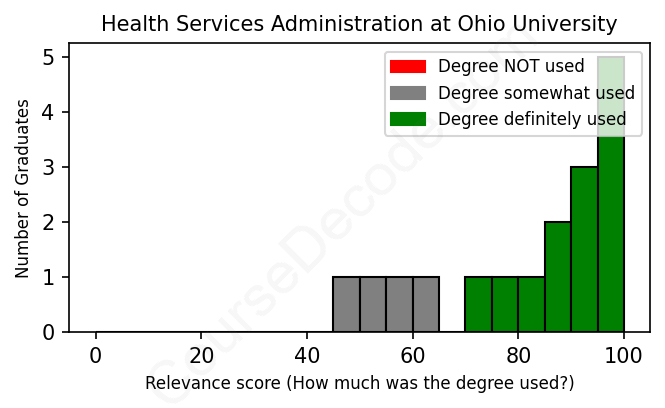
First, some facts. Of the Health Services Administration graduates from Ohio University we've analyzed , here's how many have used (or NOT used) their degree in their career:

These are estimates based on AI analysis of 17 LinkedIn profiles (see below).
The verdict? Significantly above average. Overall, with an average relevance score of 82%, Health Services Administration graduates from Ohio University have a much higher likelihood (+15%) of finding work in this field compared to the average graduate across all fields:
And for comparison, here's the chart for all profiles we've looked at across all degrees.
Also, after graduating, 35% of these graduates have pursued further education other than another Bachelor's degree (such as a Masters degree or other), which is right in line with the average across all fields.
See the details:
|
Relevance score: 86% We think this person has gone into a career highly relevant to their degree. We think this person has gone into a career highly relevant to their degree.
DEGREE INFOGraduated in 2016 from Ohio University with a Bachelor's degree in Health Services Administration. Also pursued further education since (see below). JOB HISTORY SINCE GRADUATIONCompliance Specialist Molina Healthcare of Ohio, Inc. Jan 2016 - Feb 2017 Provider Network Services Specialist  Anthem Jun 2017 - Mar 2019 Legal Specialist  Anthem Mar 2019 - Jun 2021 PBM Compliance Manager  CarelonRx Jun 2021 - Present FURTHER DEGREES DONE SINCE GRADUATINGMSJSeton Hall University School of Law 2017 - 2019 ABOUTNo information provided. |
The top 10 most common jobs done by the graduates we've analyzed (ranked most common to least) are:
After diving into the career paths of graduates from Ohio University's Health Services Administration program, it seems like they often head into roles that vary in relevance to their studies. The most common positions held by these alumni are often supportive or administrative roles within healthcare settings, like Patient Financial Specialists, Administrative Assistants, and various managerial roles. These jobs can range from directly applying health services knowledge—like a Patient Care Representative who works directly with patients—to positions that skirt around the core focus of the degree, such as administrative tasks that might be found in a general healthcare setting. However, not all positions feel tied to health services. Some graduates take on roles like Studio Manager or Compliance Consultant in contexts that don’t heavily utilize their Health Services Administration skills. While many career paths are clearly linked to the principles of health services administration—like patient access management and compliance—the relevance of their jobs is mixed. It highlights a trend where graduates find themselves in healthcare-related fields but don’t always engage in tasks that fully leverage their educational background, which can lead to varying levels of satisfaction and career fulfillment. Overall, while some graduates score jobs tightly knit to their education, others find themselves taking broader roles in the healthcare ecosystem that may not use their specific training nearly as much.
Here is a visual representation of the most common words in job titles for Health Services Administration graduates (this is across all Health Services Administration graduates we've analyzed, not just those who went to Ohio University):

Graduates of the Health Services Administration program at Ohio University seem to have carved out solid career trajectories for themselves. Right after graduation, many of them started off in administrative roles within healthcare settings, like administrative assistants or patient care representatives. These first jobs often act as a stepping stone, helping graduates gain practical experience and understand the workings of healthcare environments. As they gain more experience—typically within 5 to 10 years—many have moved up to managerial or even director-level positions, indicating a progression that leverages their initial experiences into more responsible roles. For example, graduates have transitioned into positions like Patient Access Manager, Regional Director, and even Executive Director roles in various healthcare organizations.
In fact, a substantial portion of these alumni ended up within healthcare systems, showing a clear relevance to their degree. Some have even shifted into roles with broader responsibilities, such as Compliance Specialists or Project Managers, indicating that their skill sets are versatile. While there are a few outliers who drifted away from healthcare-specific positions, the overwhelming trend points toward growing career paths that are connected to the core principles taught in their Health Services Administration program. This suggests that obtaining a degree from Ohio University in this field can indeed lead to promising and relevant career opportunities in healthcare management and administration.
Getting a Bachelor's degree in Health Services Administration at Ohio University is pretty manageable, especially if you have a genuine interest in the healthcare field. The coursework can be a mix of business principles and healthcare topics, so if you're good with organization and can handle some stats, you should be fine. It's not like engineering or physics, which can be super intense. You might have to juggle group projects and some internships, but overall, it's often considered easier than many other majors. Just stay on top of your readings and assignments, and you'll do great!
Most commonly, in the LinkedIn profiles we've looked at, it takes people 4 years to finish a Bachelor degree in Health Services Administration.
Looking at these graduates from Ohio University and their job paths, it seems like some definitely made decent money while others had more of a struggle. For instance, graduates who landed roles in administrative management or clinical nursing saw career progress that likely includes good pay, especially those moving into director-level positions. On the other hand, some of the earlier jobs, like administrative assistants or interns, typically earn much less, and it seems like their paths took longer to lead to higher salaries. Overall, though, the trend appears favorable for those who've moved into senior roles—many likely enjoy a solid income now—but it’s clear there are varying degrees of financial success among them!
Here is a visual representation of the most common words seen in the "about" section of LinkedIn profiles who have a Bachelor degree in Health Services Administration (this is across all Health Services Administration graduates we've analyzed, not just those who went to Ohio University). This may or may not be useful:

Here are all colleges offering a Bachelor degree in Health Services Administration (ordered by the average relevance score of their Health Services Administration graduates, best to worst) where we have analyzed at least 10 of their graduates:
| College | Score | Count |
|---|---|---|
 Ohio University Ohio University
|
82 | 17 |
 University of Central Florida University of Central Florida
|
65 | 40 |
 Florida International University Florida International University
|
65 | 19 |
 City University of New York-Herbert H. Lehman College City University of New York-Herbert H. Lehman College
|
58 | 14 |